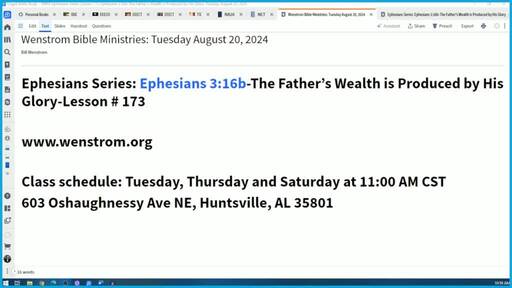Ephesians 3.16b-The Father's Wealth is Produced By His Glory
Wenstrom Bible Ministries
Pastor-Teacher Bill Wenstrom
Tuesday August 20, 2024
Ephesians Series: Ephesians 3:16b-The Father’s Wealth is Produced by His Glory
Lesson # 173
Ephesians 3:14 For this reason, I make it my habit of bending my knees in the presence of the Father 15 from whom each and every family located in the heavens as well as located upon the earth is designated a name. 16 I make it a habit of occupying myself with praying that according to the wealth produced by His glory He would cause each and every one of you as a corporate unit to be given strength by means of power through the personal intermediate agency of His Spirit for the benefit of your inner being. (Lecturer’s translation)
Ephesians 3:16 is composed of the following:
(1) direct object clause hina dō hymin…dynamei krataiōthēnai (ἵνα δῷ ὑμῖν…δυνάμει κραταιωθῆναι), “that…He would cause each and every one of you as a corporate unit to be given strength by means of power.”
(2) prepositional phrase: kata to ploutos tēs doxēs autou (κατὰ τὸ πλοῦτος τῆς δόξης αὐτοῦ), “according to the wealth produced by His glory.”
(3) prepositional phrase: dia tou pneumatos autou (διὰ τοῦ πνεύματος αὐτοῦ), “through the personal intermediate agency of His Spirit.”
(4) prepositional phrase: eis ton esō anthrōpon (εἰς τὸν ἔσω ἄνθρωπον), “for the benefit of your inner being.”
The noun ploutos (πλοῦτος), “wealth” is used in a figurative sense to refer to a spiritual and material abundance of material and spiritual possessions and spiritual resources possessed by God the Father.
In other words, it is used figuratively of the spiritual and material wealth or prosperity of the Father.
The articular construction of this word is monadic which expresses the idea that this wealth is unique to the Father’s glory.
The noun doxa (δόξα) refers to the honor, which is accorded to that which characterizes the Father and the splendor which characterizes Him.
It speaks of the fact that the Father is a transcendent being in that He exceeds the limits of human and angelic understanding and experience.
Specifically, it is related to the manifestation of the Father’s transcendent character and nature, which exceeds the limits of human and angelic understanding and experience.
This word is modified by the genitive masculine singular form of the intensive personal pronoun autos (αὐτός), “His” which refers of course to God the Father.
It functions as a genitive of possession indicating that this glory “belongs to” the Father in that it manifests His holy character and nature.
This noun doxa (δόξα) functions as a genitive of production, which expresses the idea that the Father’s glory, i.e., the manifestation of His transcendent character and nature, “produces” His wealth, i.e., the abundance of His spiritual and temporal resources.
A comparison of Scripture with Scripture indicates that the Father’s transcendent character and nature was manifested through the person and work of His Son during His First Advent and through the work of the Holy Spirit on behalf of the recipients of this letter and all Christians who benefit from the Father’s wealth through faith in Jesus Christ and the baptism of the Spirit.
The church age believer possesses every spiritual and temporal blessing in the heavens because of their union and identification with Jesus Christ (cf. Eph. 1:3-14).
The Son’s perfect life of obedience to the Father’s will and His crucifixion, death, burial, resurrection and session at the right hand of the Father manifested the Father’s transcendent character and nature and delivered the church age believer from eternal condemnation, condemnation from the Law, enslavement to the sin nature, Satan and his cosmic system, personal sins, spiritual and physical death.
At the moment of justification, the Holy Spirit manifested the Father’s transcendent character and nature by identifying the church age believer with Jesus Christ in His crucifixion, death, burial, resurrection and session at the right hand of the Father.
The church age believer’s faith, which resulted in the Father declaring them justified, appropriated the omnipotence of God, which delivered the church age believer from eternal condemnation, condemnation from the Law, enslavement to the sin nature, Satan and his cosmic system, personal sins, spiritual and physical death.
This union and identification with Jesus Christ results in the Father’s spiritual and temporal wealth or prosperity to the flow to the church age believer.
Therefore, the Father’s glory “produces” His wealth in the sense that His wealth flows to the church age believer through the person and work of His Son and the person and work of the Holy Spirit whose work manifests the Father’s transcendent character and nature.
In other words, the work of the Son and the Spirit glorifies the Father because it manifests His transcendent character and nature.
The noun ploutos (πλοῦτος) is the object of the preposition kata (κατά), which is functioning as a marker of correspondence which indicates that the Father’s wealth, which is produced by His glory, i.e., the manifestation of His transcendent character and nature through the person and work of both the Son and the Spirit is “in agreement with” the power of the Holy Spirit.
Thus, this preposition indicates that the Father’s wealth, which is produced by His glory, i.e., the manifestation of His transcendent character and nature as manifested by the work of the Son and the Spirit is “the equivalent of” or “identical to” the Holy Spirit who is able to strengthen the church age believer by means of power in their inner being or new nature.
The reason why the Father’s wealth, which is produced by the manifestation of the Father’s glory, i.e., the manifestation of His transcendent character and nature corresponds to or is equivalent to the Holy Spirit strengthening the church age believer by means of power for the benefit of the new indwelling Christ nature is that both Jesus Christ and the Holy Spirit manifest the Father’s transcendent character and nature.

